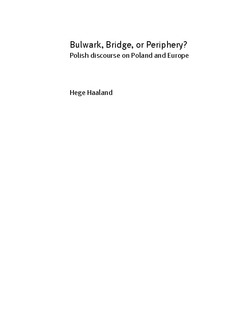| dc.contributor.author | Haaland, Hege | |
| dc.date.accessioned | 2016-06-21T12:15:58Z | |
| dc.date.accessioned | 2016-06-22T09:06:46Z | |
| dc.date.available | 2016-06-21T12:15:58Z | |
| dc.date.available | 2016-06-22T09:06:46Z | |
| dc.date.issued | 2001 | |
| dc.identifier.citation | NUPI-rapport nr. 263. NUPI, 2001 | nb_NO |
| dc.identifier.isbn | 82-7002-169-5 | |
| dc.identifier.uri | http://hdl.handle.net/11250/2393542 | |
| dc.description | - | nb_NO |
| dc.description.abstract | After the Communist regime started crumbling in 1989, the official foreign policy of Poland has been redefined. A central characteristic in this process has been Polish involvement in the process of European integration and an application for membership in the European Union. These policies have not been undisputed in Polish political debates. Analyses of Polish European policy tend to concentrate on the official foreign policy of Poland and the strategies of cooperation and integration proposed by EU member states. What they seem to forget is that debates on Europe and what shape the relations between Poland and Europe should take exist within Poland as well. This thesis is an attempt to fill in this gap. What kind of Europe do Poles promote? This thesis argues that foreign policies are conditioned by the ways in which certain concepts are represented in discourse. Its purpose is to present you with an overview of the existing Polish European policy positions, analyze the representations on which they rest and, on the basis of the analysis, draw some conclusions about the preconditions of Polish European policies and make some tentative predictions for they may
develop in the future. The purpose of the analysis is thus both explanatory and predicative. Discourses are closely related to the discourses that precede them. I believe that a background study of Polish discourse during Communism is an
important background study in order to explicate the foundations of today’s discourse. I will therefore devote a considerable part of the thesis to the discourse of this period. | nb_NO |
| dc.description.sponsorship | The Nordic Network for Security Studies, The Sasakawa Foundation | nb_NO |
| dc.language.iso | eng | nb_NO |
| dc.relation.ispartofseries | NUPI Rapport;263 | |
| dc.rights | Navngivelse-Ikkekommersiell-DelPåSammeVilkår 3.0 Norge | * |
| dc.rights.uri | http://creativecommons.org/licenses/by-nc-sa/3.0/no/ | * |
| dc.title | Bulwark, Bridge, or Periphery? Polish discourse on Poland and Europe | nb_NO |
| dc.type | Research report | nb_NO |
| dc.date.updated | 2016-06-21T12:15:58Z | |
| dc.source.pagenumber | 106 p. | nb_NO |
| dc.identifier.cristin | 1362925 | |
| dc.subject.keyword | EU / EU | |
| dc.subject.keyword | Europa / Europe | |

